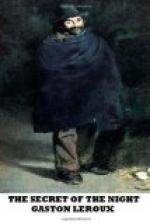The reporter studied all these widely-different types and made his observations while pretending to a ravenous appetite, which served, moreover, to fix him in the good graces of his hosts of the datcha des Iles. But, in reality, he passed the food to an enormous bull-dog under the table, in whose good graces he was also thus firmly planting himself. As Trebassof had prayed his companions to let his young friend satisfy his ravening hunger in peace, they did not concern themelves to entertain him. Then, too, the music served to distract attention from him, and at a moment somewhat later, when Matrena Petrovna turned to speak to the young man, she was frightened at not seeing him. Where had he gone? She went out into the veranda and looked. She did not dare to call. She walked into the grand-salon and saw the reporter just as he came out of the sitting-room.
“Where were you?” she inquired.
“The sitting-room is certainly charming, and decorated exquisitely,” complimented Rouletabille. “It seems almost a boudoir.”
“It does serve as a boudoir for my step-daughter, whose bedroom opens directly from it; you see the door there. It is simply for the present that the luncheon table is set there, because for some time the police have pre-empted the veranda.”
“Is your dog a watch-dog, madame?” asked Rouletabille, caressing the beast, which had followed him.
“Khor is faithful and had guarded us well hitherto.”
“He sleeps now, then?”
“Yes. Koupriane has him shut in the lodge to keep him from barking nights. Koupriane fears that if he is out he will devour one of the police who watch in the garden at night. I wanted him to sleep in the house, or by his master’s door, or even at the foot of the bed, but Koupriane said, ’No, no; no dog. Don’t rely on the dog. Nothing is more dangerous than to rely on the dog. ’Since then he has kept Khor locked up at night. But I do not understand Koupriane’s idea.”
“Monsieur Koupriane is right,” said the reporter. “Dogs are useful only against strangers.”
“Oh,” gasped the poor woman, dropping her eyes. “Koupriane certainly knows his business; he thinks of everything.”
“Come,” she added rapidiy, as though to hide her disquiet, “do not go out like that without letting me know. They want you in the dining-room.”
“I must have you tell me right now about this attempt.”
“In the dining-room, in the dining-room. In spite of myself,” she said in a low voice, “it is stronger than I am. I am not able to leave the general by himself while he is on the ground-floor.”
She drew Rouletabille into the dining-room, where the gentlemen were now telling odd stories of street robberies amid loud laughter. Natacha was still talking with Michael Korsakoff; Boris, whose eyes never quitted them, was as pale as the wax on his guzla, which he rattled violently from time to time. Matrena made Rouletabille sit in a corner of the sofa, near her, and, counting on her fingers like a careful housewife who does not wish to overlook anything in her domestic calculations, she said:




